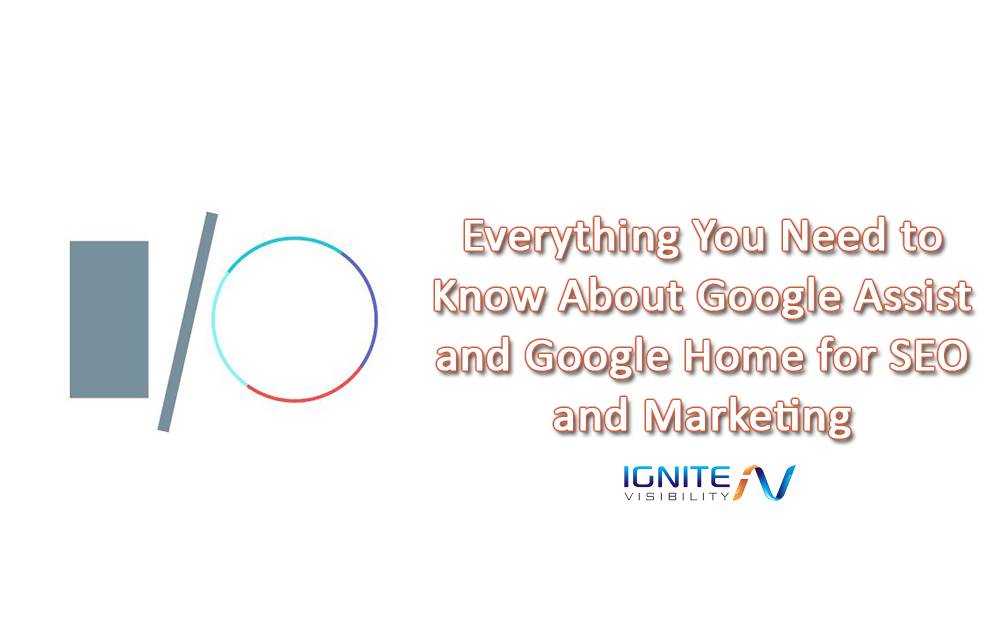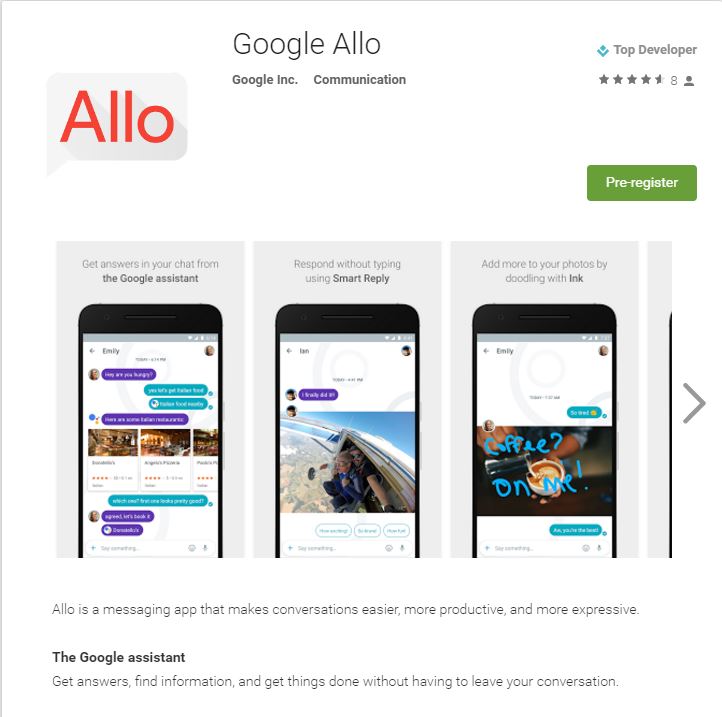
Everything You Need to Know About Google Assist and Google Home for SEO and Marketing
On May 18, 2016, at the Google I/O Conference, Google announced Google Home. That’s a decorative speaker that houses the new Google assistant.
Google Home is also widely viewed as a platform that’s meant to compete with Amazon Echo. Like Echo, it helps people get answers to their questions and complete basic tasks, such as ordering food.
To handle those responsibilities, Google Home will enlist the aid of Google assistant. That tool goes beyond simple voice recognition and also enables users to have a conversation with Google. They can pose questions and then refine their questions based on the initial answers that they receive.
Reluctant Adoption
You might think that voice search would have been widely adopted right out of the gate. However, that’s not how it played out.
When Siri, Apple’s voice-recognition software, debuted back in 2010, iOS users were reluctant to embrace the new technology. Old habits die hard, even when newer habits can make your life easier.
As late as 2013, 85% of iOS users said that they still did not use Siri.
Change is good, though, and the iOS community eventually made use of Siri. By 2014, Google itself took an interest in voice search and even released an infographic showing that millennials and adults believed that voice search was the wave of the future.
But is it? While voice search might offer many conveniences for people who are trying to get answers online, is it really a model that’s sustainable from a business perspective?
Problems With Voice Search

Google will provide us with voice search data in the Search Console at some point in the future.
For starters, voice search doesn’t offer analytics to digital marketers so they can track how well their sites are ranking for certain keywords. That’s going to pose a problem for SEOs.
There are rumors that Google will provide us with voice search data in the Search Console at some point in the future. As of now, though, that data isn’t available and we can safely file any rumors about the future under the “Eventually We’re All Dead” folder.
Also, Google delivers its answers in voice format instead of directing people to websites. That pretty much defeats the purpose of almost every SEO’s work for the past decade. At least at first blush.
Publishers who invest time and money in SEO won’t realize the fruits of their labor from users who use voice search. Instead, those users will be delivered audible answers. They won’t need to click on anything, see any brand names, view any pop-ups, see any banner ads, or have an opportunity to click on a call-to-action.
Clearly, that’s going to be a problem for digital marketers who want to monetize their brands online. Google isn’t going to audibly point people to a website. Instead, it’s just going to give them the answers they’re looking for.
The new voice format is especially going to pose a problem for sites that present lots of stats and figures. Google assistant will just dictate what it finds on the site rather than directing people to the site itself.
Finally, Google might not pronounce brand names correctly. Although the search giant is very smart, it doesn’t often know how to pronounce certain proper nouns. Just a couple of years ago, Google mispronounced the ESPN brand name (pronouncing it “ESS-PEN”). If Google has a problem pronouncing that brand name, what do you think it’s going to happen if it tries to pronounce a lesser-known brand name and that’s unusually spelled?
Not Just Giving People Links?
During his keynote address at Google I/O, CEO Sundar Pichai specifically said that “It’s not just enough to give [users] links — we really need to help them get things done in the real world.”
That attitude by Google could point to a cataclysmic shift for digital marketers. If the search giant is no longer sending people to links and just dictating answers, how will publishers monetize their content?
But there’s an even better question: How will Google monetize its own search results?
It’s hard to believe that the Big “G” isn’t already coming up with ideas about how it can provide a rich user experience with Google assist while simultaneously introducing a new revenue stream. What the company has planned, though, is a mystery at this time.
A Better User Experience
Questions about monetization aside, it does appear that voice search does offer a superior user experience. People will get the answers they need quickly without having to type anything. Even better, Google assist operates in a conversational format.
There’s more to it than that, though. Users will also be able to accomplish simple tasks with the aid of the tool. For example, they can order tickets to a movie or food for delivery.
At the end of the day, that’s the kind of stuff good software is supposed to do, isn’t it? It’s supposed to make our lives simpler.
Savvy marketers will understand that upfront and brainstorm up ways that they can monetize their brands with the aid of Google assistant. Growth hackers who are “early adopters” with Google assistant will realize a competitive advantage as they carve out a niche for themselves using the search giant’s latest technology.
The others will get left behind.
Questions for Marketers
Google assistant will answer queries and act as a virtual assistant with the aid of various sources, including Google’s own algorithm for finding information online and third-party apps. That leaves several questions for marketers:
- Will Google only use third-party apps that process orders with Google Wallet/Android Pay? Or, will it include all reputable apps in its portfolio of resources?
- How will Google handle competing apps? Right now, if you Google “get a ride home,” Lyft appears in the SERPs ahead of Uber (although they’re both on Page 1). Does that mean that Google assistant will prefer Lyft over Uber when someone asks it to book a ride home? Or will Google assistant ask for a specific brand name when competing options are available? That would certainly add conversation to the “conversational” aspect of the software.
- Will Google assistant support negative keywords? If so, how?
- Will Google include paid listings in Google assistant? If so, how?
- Will Google support big-name e-commerce sites that are sometimes viewed as competitors (e.g., Amazon)? If so, how?
A Closed System
Sadly, Google assistant is built on a closed system. That is, it’s not using voice-recognition technology that’s widely available to the general public (like HTML and PHP).
Why? Because there’s an inherent value in proprietary software. Company management thinks they can add value to their shareholders by offering a state-of-the-art voice-recognition solution that’s also corporate property.
That makes sense from a business perspective. However, the wave of the web is towards open-source technology. The World Wide Web Consortium (W3C) has already introduced a digital document standard for voice dialogs called Voice XML (VXML).
Google has decided not to work with the W3C and instead pursue its own system. That’s going to create headaches for developers down the road who are trying to integrate robust solutions requiring voice technology.
Google Allo

Google Allo featured with Google Assistant
Google Allo is a new app that should be available this summer. It’s a smart messenger that enables users to send animated graphics, share media, plan events, and even buy products.
Also: Google Allo will feature Google assistant.
That app will probably be the first time that most mobile users get to see Google assist in action. So, this summer, the early reviews for the new tool should be in.
Other Competition
Google isn’t alone in its effort to transform software into virtual assistants. As we’ve seen, Google assistant as part of Google Home is widely viewed as an answer to Amazon Echo.
But there are other competitors as well.
At last month’s Facebook F8 conference, CEO Mark Zuckerberg said that his company is working on “chatbots.” Those will be modules within Facebook Messenger that will help people order flowers, answer questions, or just browse through the latest headlines.
In addition to that offering, there’s also Apple’s Siri and Microsoft’s Cortana. All the big names are trying to make software that acts as a digital butler.
There’s also a push to make software more conversational. Oren Jacob, the CEO and co-founder of PullString, said that conversational robots might be closer than we thought.
“There are all kinds of intimate family conversations that you’re having back and forth, [and] you would now have another voice in the room you’re inviting to have that discussion with you,” he said. “And that is a new place for computers to interact with the human condition.”
Jacob should know. His company makes interactive apps and toys that are designed for conversations with children.
A Google Just for You
When Pinchai unveiled Google assist at the I/O Conference earlier this year, he said that the software’s understanding of natural language is “far ahead of what anyone else can do.”
Then, he summed up the new technology in one sentence: “We think of this as building each user their own individual Google.”
Time will tell if the user community will view it the same way.